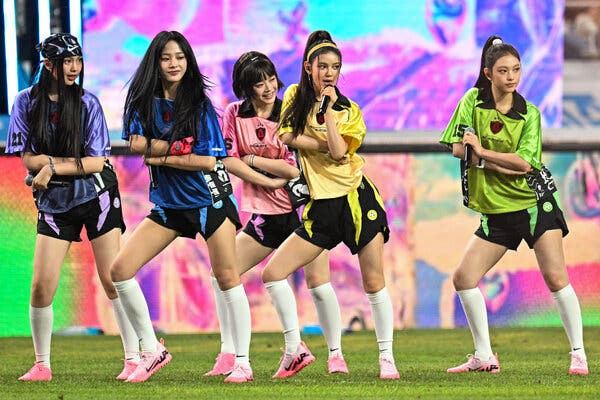Critic’s Notebook
The breakout girl group went public with complaints against its parent company, Hybe, which has just released a new TV series and film about the control it exerts over stars.

A huge part of the success of NewJeans — the most creatively promising new K-pop act of the past two years — has been its music videos: stylistically sophisticated, vividly colorful, palpably joyful. Starting with music that deploys top-shelf songwriting buoyed by production savvy about global microtrends, the group developed a singular aesthetic to go with it, drawing equally from high fashion, lived-in nostalgia and contemporary cuteness.
So it was striking when, a couple of weeks ago, the group released a video performance unlike any that preceded it. In a live broadcast on a burner YouTube account, the group’s five members — Danielle, Haerin, Hanni, Hyein and Minji — spoke for almost 30 minutes about their dissatisfaction with their parent company, Hybe. They particularly focused on how it had de-emphasized the role of the group’s executive producer, Min Hee-jin, in their work.
Here was a group putting its external image and its internal leverage at risk to argue for their creative lives. It is an infrequent scenario at this level in K-pop, a genre and business in which careful choreography — of music, visuals and star behavior — is crucial to the power of the art.
This livestream, of course, was as art directed as any of the group’s technicolor music videos. The members dressed largely in black, speaking softly in an anonymous office. Out in the world, NewJeans is vibrant, dynamic and approachably fun; in this clip, which some fans speculated was secretly orchestrated by Min, the members were reduced to spiritless cogs, as if trapped and suffocated by the corporation itself.
For almost as long as K-pop has been a global force, it has been an exemplar of the controversial virtues of top-down control. American pop labels essentially abandoned this mode more than a decade ago, following the boy band and Britney-Christina era. The influence of social media in creating bottom-up hits and stars has all but invalidated the label-knows-best mode of creation. But K-pop’s commitment to that ethic persists, and has made exactitude into an artistic virtue.



